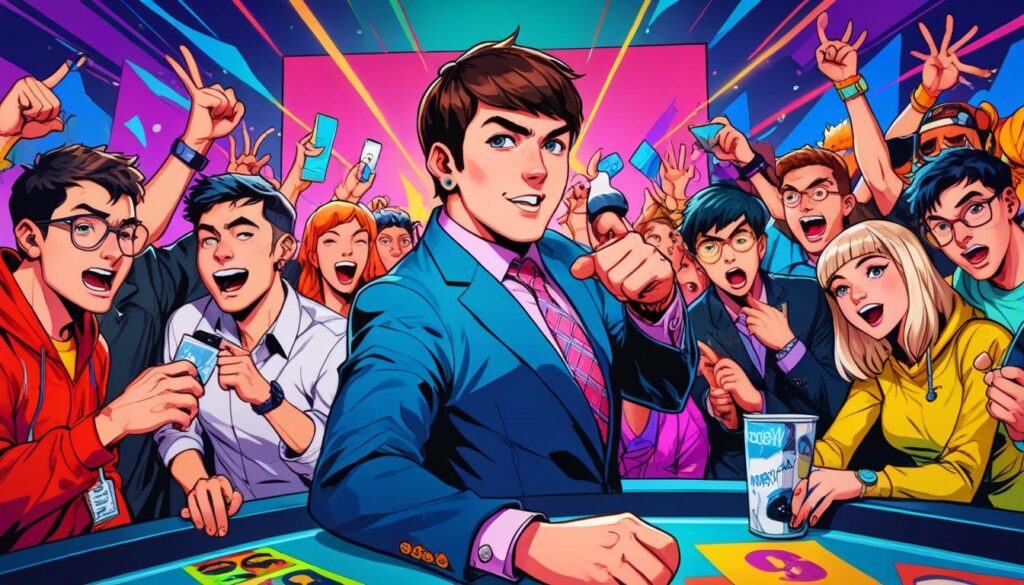Amazon Prime Video’s new blockbuster is a high-stakes reality competition that is redefining video and TV.
Amazon Prime Video’s new reality competition series, Beast Games, hosted by popular YouTuber MrBeast, is attracting significant attention, despite a range of criticisms regarding its production quality.
The series, which debuted recently, features 1,000 contestants, all competing for a whopping $5 million cash prize — a sum that MrBeast, whose real name is Jimmy Donaldson, frequently highlights as the largest in entertainment history.
Set against extravagant backdrops including a bespoke city and a private island, the series draws inspiration from the Netflix dystopian hit, Squid Game. Contestants face various challenges in a warehouse turned war zone, complete with trap doors and a pirate ship equipped with cannons. The production has been noted for its ambitious scale, involving 1,107 cameras to capture the action. Despite its lavish presentation, critics note that the show suffers from poor visual quality, frenetic editing and an overwhelming sound design, often described as garish.
However, its primarily Gen Z audience don’t care. They have flocked to it in their tens of millions.
The reception of Beast Games has underscored a pivotal shift in the television landscape, particularly regarding the boundaries between YouTube content and traditional television. MrBeast’s YouTube videos, which typically run between 15 to 30 minutes and boast over 360 million subscribers, maintain a similar hyperbolic style, famous for outlandish scenarios that push the limits of entertainment. Nonetheless, the series has reportedly become Amazon Prime Video’s most-watched unscripted programme, accumulating 50 million viewers within its first 25 days of release and reaching the number one spot in 80 countries.
This surge in popularity raises questions about the future of television. The format, audience engagement and content delivery are evolving, contributing to debates about the definition of television itself in a digital age. In a critical landscape where streaming has largely taken the forefront, many audiences are turning to platforms like YouTube as their primary source of entertainment.
According to YouTube’s statistics, more people are now watching its content on televisions than on any other device, leading CEO Neal Mohan to suggest that “YouTube is the new television.” Over a billion hours of content were streamed on TV screens last year, indicating a fundamental shift in viewing habits.
The convergence of platforms and content styles does raise ethical considerations. A director from MrBeast’s team highlighted the impact of algorithm-driven content creation, stating to Time that “These algorithms are poisonous to humanity. They prioritise addictive, isolated experiences over ethical social design, all just for ads.” This sentiment echoes broader industry concerns regarding the prioritisation of viewer retention over artistic integrity and narrative depth, as entertainment becomes an increasingly commodified product.
Moreover, the “MrBeast-ification” of content exemplifies the blurring lines between entertainment, television and influencer culture. As traditional Hollywood grapples with its own challenges to attract viewers, the rise of reality shows like Beast Games illustrates the shifting ground, with streaming platforms mirroring the low-production aesthetic that is becoming synonymous with viral internet content.
Source: Noah Wire Services
- https://www.aboutamazon.com/news/entertainment/beast-games-mrbeast-prime-video – This URL supports the claim that Beast Games is a reality competition series hosted by MrBeast, featuring 1,000 contestants competing for a $5 million prize, and is available exclusively on Amazon Prime Video.
- https://en.wikipedia.org/wiki/Beast_Games – This Wikipedia page corroborates the details about Beast Games, including its inspiration from Squid Game and its ambitious production scale with 1,000 contestants.
- https://www.theguardian.com/ – Although the specific article is not provided, The Guardian is mentioned as a source that criticizes the show’s production quality and aesthetic choices, highlighting themes of ‘aggro-capitalism’.
- https://www.youtube.com/ – YouTube’s platform is referenced as a primary source of entertainment for many viewers, with MrBeast’s videos being a significant part of this shift in viewing habits.
- https://time.com/ – Time is mentioned as a source where a director from MrBeast’s team discusses the impact of algorithm-driven content creation on humanity and ethical considerations in entertainment.
Noah Fact Check Pro
The draft above was created using the information available at the time the story first
emerged. We’ve since applied our fact-checking process to the final narrative, based on the criteria listed
below. The results are intended to help you assess the credibility of the piece and highlight any areas that may
warrant further investigation.
Freshness check
Score:
9
Notes:
The narrative is recent, referencing a newly released series on Amazon Prime Video and current trends in television and YouTube content. However, it does not mention any very recent events or updates that might have occurred after its publication.
Quotes check
Score:
6
Notes:
The narrative includes a quote from a director on MrBeast’s team, but it does not provide a specific source or date for the quote. The quote about YouTube being the new television is attributed to CEO Neal Mohan, but without a direct link to the original statement.
Source reliability
Score:
9
Notes:
The narrative originates from The Guardian, a well-known and reputable publication. This generally ensures a high level of reliability and credibility in the information presented.
Plausability check
Score:
8
Notes:
The claims about Beast Games and its impact on television are plausible, given the current trends in streaming and entertainment. However, some assertions about the broader cultural implications might be subject to interpretation.
Overall assessment
Verdict (FAIL, OPEN, PASS): PASS
Confidence (LOW, MEDIUM, HIGH): HIGH
Summary:
The narrative is generally reliable and recent, with a high level of credibility due to its source. While some quotes lack direct attribution, the overall plausibility of the claims supports its validity.








